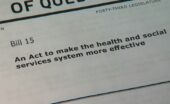Molly Minturn - My family is heartbroken to share that my father died in surgery on Monday, Feb. 10. It…
Wednesday Night #2183
Written by Diana Thebaud Nicholson // January 17, 2024 // Wednesday Nights // Comments Off on Wednesday Night #2183
Ed Broadbent 1936-2024 R.I.P.
The Broadbent Institute announced his death in a statement on January 11th.
“Our country has lost a fierce champion for ordinary Canadians, an intellectual who strongly believed in building a good society,” the statement said. “Ed devoted decades of his life to fighting for justice and equality in Canada and around the world.” There has been a flood of tributes from political allies and opponents, associates in his many activities, mentees and friends of all ages. He leaves a remarkable legacy which is well documented in the first full-length treatment of his ideas and remarkable seven-decade engagement in public life, published in October 2023 –Seeking Social Democracy: Seven Decades in the Fight for Equality by Edward Broadbent, Frances Abele, Luke Savage and Sauvé Fellow Jonathan Sas.
Sunday was the 100th day since the October 7th Hamas attack; and Netanyahu Vows to Keep Fighting; after three months of relentless war waged against Hamas/Gaza, and some 23,000 deaths, Israel Faces Accusation of Genocide as South Africa Brings Case to U.N. Court. On Thursday, South Africa argued that Israel “means to create conditions of death” in Gaza, and demanded the court order an emergency suspension of the military campaign.
Kyle Matthews…says he doubts either the Israeli government or Hamas would heed any ruling from the court.
The Iran-backed Houthi attacks on shipping in the Red Sea are an increasing cause for concern.
Julien sent the link to Reading Khamenei: The World View of Iran’s Most Powerful Leader Though it dates from 2009, it is still applicable, especially as Iran is active behind the scenes in Middle East affairs.
C Uday Bhaskar writes that China and India have a duty to act on Houthi threat to global shipping
“The Houthi rebels, until recently considered an obscure group confined to Yemen, have taken up the cause of the blighted Palestinians and begun targeting merchant ships with an Israeli connection in the Red Sea. Subsequently, even ships with no link to Israel were targeted.
This has caused a major disruption to global merchant traffic that transits the Suez Canal and enters the Indian Ocean through the Red Sea and the narrow Bab-el-Mandeb strait between Yemen on the Arabian Peninsula and Djibouti and Eritrea in the Horn of Africa.
About 12 per cent of global trade passes through the Bab-el-Mandeb and all the major economies of the world – particularly China, Japan and India – are dependent on the safety and stability of these waters.”
Late breaking news: Yemen’s Houthi rebels attack a US-owned ship in the Gulf of Aden with bomb-carrying drone
15-19 January At Davos, conflict, climate change and AI get top billing as leaders converge for elite meeting The 54th annual meeting of the World Economic Forum brings together 2,800 of the world’s most powerful people, including 60 or so heads of state and government.
The Earth is heating up, as is conflict in the Middle East. The world economy and Ukraine’s defense against Russia are sputtering along. Artificial intelligence could upend all our lives. See Long reads below.
As the powerful and the pretentious ponder the good, bad and ugly aspects of AI, Rise of the AI psychbots asks “some questions that current tech policy is ill-suited to handle, such as what part of ourselves we “own,” how the law diverges from our own instinctive sense of justice — and also, what digital version of us may survive into the future, whether or not we want it to”.
A pinch of the Davos “secret sauce”? John Ivison, writing for the GZERO daily, suggests that there are problems in the idyllic capitalist mecca.
“This year’s theme, as declared by Klaus Schwab, is “rebuilding trust” in a fractured world. The WEF founder was talking about trust in a more certain and optimistic future for people around the globe. But the forum has its own credibility issues that have led many to question whether it is a malign, even malevolent, institution.”
The Economist asks “Is philanthropy working? We’re not convinced. More than $1trn is thought to be sitting in American private foundations and more than $200bn in donor-advised funds (think of a savings account for philanthropists). All that means lots of money is earmarked to do some good, but it gets to worthy causes far too slowly. Read our new, multi-chapter report on how philanthropy needs to change faster. That could be a topic to discuss at Davos in the coming days.” – Especially when linked to the message contained in the letter signed by 268 millionaires and billionaires from 17 countries and published Wednesday: “Our request is simple: we ask you to tax us, the very richest in society,” Proud to pay more
-A new study published Wednesday also found that 74% of wealthy people support higher taxes placed on their fortunes.
After attempts to meddle in Taiwan’s elections fail, China takes stock
(WaPo) Taiwanese voters have made it clear — for the third time in a row — that they don’t want a leader who will kowtow to China. The democratic island on Saturday elected as president Lai Ching-te, the current vice president and former independence advocate whom Beijing views as a dangerous “separatist.”
Now, Beijing must craft a response.
On the eve of Martin Luther King Day, Heather Cox Richardson wrote: “…heroism is neither being perfect, nor doing something spectacular. In fact, it’s just the opposite: it’s regular, flawed human beings choosing to put others before themselves, even at great cost, even if no one will ever know, even as they realize the walls might be closing in around them.”
So Trump won Iowa.
Asa Hutchinson and Vivek Ramaswamy have dropped out – did anyone notice?
Axios was one of the first sources to mention the low turnout and implications for voting patterns.
Matt Galloway on CBC’s The Current, interviewed one Iowa voter, who says the criminal charges against Trump are “trumped up” [sigh!] and won’t sway his support. Matt Galloway maintains an admirably impeccable neutral tone throughout the interview.
On to New Hampshire!
After attempts to meddle in Taiwan’s elections fail, China takes stock
(WaPo) Taiwanese voters have made it clear — for the third time in a row — that they don’t want a leader who will kowtow to China. The democratic island on Saturday elected as president Lai Ching-te, the current vice president and former independence advocate whom Beijing views as a dangerous “separatist.”
Now, Beijing must craft a response.
Global politics in 2024: It’s not all doom and gloom
Ian Bremmer sounds a welcome positive note. “You might’ve come out of last week’s newsletter – and Eurasia Group’s 2024 Top Risks report – feeling a little scared about the year ahead. And sure enough, this will be an unprecedentedly challenging year from a political and geopolitical standpoint, marked by three ongoing and expanding wars: Russia vs. Ukraine, Israel vs. Hamas, and the United States vs. itself. But there are plenty of bright spots, too. …”
Putin’s War does not offer much to be hopeful about
Putin and Zelenskiy Are Both Hugging Friends Closer
Volodymyr Zelenskiy and Vladimir Putin are hugging their friends close as Russia’s war on Ukraine approaches its third year. … For all the warmth toward Zelenskiy in the Swiss Alps, more than $100 billion in military aid and financial support for Ukraine from the US and the European Union remains frozen by political disputes in Washington and Brussels. That’s encouraged Putin to believe the war is turning in his favor as Russia cranks up defense production and he moves to secure another term in March presidential elections.
Putin says Ukraine’s statehood at risk if pattern of war continues. Putin made his televised comments a day after Switzerland agreed to host a global summit at the request of Ukrainian President Volodymyr Zelenskiy.Putin dismissed “so-called peace formulas” being discussed in the West and Ukraine and what he called the “prohibitive demands” they entailed.
Ukrainian President, Volodymyr Zelensky was at Davos slamming Russia for levelling Ukraine. He called on the West to boost military aid to Kyiv. He said that Putin embodies war and called the Russian President a ‘predator.’
Canada economy and immigration
The debate over housing affordability, cost of living and the role of immigration (especially international students) continues. Minister of Immigration Marc Miller has been busy giving interviews to just about anyone. Tasha Kheiriddin posits that Immigration policy could backfire on Liberals, noting that Even 62 per cent of current immigrants think Canada is letting in too many people.
Next week’s Cabinet retreat (Prime Minister to hold Cabinet retreat to focus on continuing to support the middle class) will no doubt solve all these problems including Canada’s declining birthrate which is the reason for the need of all those immigrants – or so we are told.
Bill 96: Group seeking injunction against Quebec’s French-language law
The injunction, which was filed Wednesday at the Superior Court in Montreal, says the bill constitutes an “encroachment on constitutional and human rights with respect to rights to life, liberty, and security; equality; healthcare services; government services; education; employment; as well as freedoms of expression and mobility, and freedom from undue state interference.”
It also calls on the Quebec government to cease introducing new measures that restrict the use of English or penalize in the name of the Charter of the French Language.
The legal challenge was launched by lawyer Michael Bergman on behalf of the Task Force on Linguistic Policy, the same group that launched a lawsuit against Bill 96 last year.
The task force’s president, Andrew Caddell, said Wednesday that since the law was passed, it has had “egregious impacts” on the province’s anglophone community.
Guy Stanley stirs the pot of language of instruction at university level with this – should we share with Minister Déry?
Sciences Po hosts 14,000 students – half are international, hailing from 150 countries. In order to recruit the best students from all around the world, Sciences Po offers programmes taught entirely in English at the undergraduate and graduate levels. No need to speak French to enrol in these programmes: students can become multilingual with intensive French language courses during their studies at Sciences Po.
Sciences Po offers dual Bachelor’s degree programmes in English, with no prior study of French required, with Columbia University, Keio University, National University of Singapore, University of British Columbia, University of California Berkeley, University College London (English track only on the Menton Campus), University of Hong Kong and University of Sydney.
And then, there is this: International student forced to leave Montreal school because of Bill 96 – disgusting and cruel!
RSV, flu and COVID-19: demystifying the triple epidemic of respiratory viruses
Nathalie Grandvaux, Professeure en biochimie des interactions hôte-virus, Université de Montréal
Two important healthcare stories
Dr. Ali Rezai – neuroscience pioneer who has developed treatments for Parkinson’s disease and other brain disorders
Neurosurgeon works to slow Alzheimer’s progression, treat addiction with cutting-edge technology and before this, Dr. Rezai was among the first to implant a pacemaker-type device in the brain which stopped uncontrollable movements suffered by Parkinson’s patients.
I Have Covid. Should I Take Paxlovid?
We asked experts about who should take the antiviral medication, how well it works and where to get it for free.
As hospitalizations and deaths from Covid-19 rise, fueled by a fast-moving new variant that now accounts for a majority of U.S. cases, Paxlovid can help protect patients from some of the worst outcomes of the illness.
In a climate-related piece, The climate brain drain, William Gagnon writes that he is leaving Canada “for a job in Singapore because…Canada is lagging in decarbonizing and climate-proofing our health-care systems — like building net-zero hospitals powered by wind and solar, reducing the use of single-use items in clinical settings, and equipping our operating rooms with air purifiers so surgeries don’t have to be paused during wildfire smoke events. … Countries like the U.K. and Singapore are taking health-care decarbonization seriously: they have solid, well-funded, and well-staffed plans to deliver on net-zero goals. Canada hasn’t even officially baselined our national health-care emissions.”
Events
John Buchanan will appear in the Yellow Door Choir Aller-Retour concerts -evenings of travel music.
Beneficiary is **@******tl.org“>the Depot, formerly the NDG Food Depot.
Each concert night will feature a Bake Sale with a delicious supply of goodies —so skip dessert and donate generously! All net proceeds from the sale go to the Depot.
Friday, January 26th and Saturday, January 27th at 7:30 PM.
The Unitarian Church, 5035 de Maisonneuve West. Metro Vendôme
Admission at the door, suggested at $20-$25.
Varia
A 1993 dystopian novel imagined the world in 2024. It’s eerily accurate.
Octavia Butler’s ‘Parable of the Sower’ predicted devastating climate change, inequality, space travel and ‘Make America great again’
Have you ever wondered why milk comes in bags in parts of Canada?
The metric system is 1 reason parts of Canada gets moo juice in bags
Canada’s conversion to the metric system in the 1970s meant dairy producers needed to replace and resize existing milk containers, which were measured in imperial quarts. Retrofitting assembly lines or replacing heavy glass bottles was an expensive prospect for the milk industry, and milk bags — which they were already experimenting with — could be easily and cheaply adjusted
Happy Tales of young(er) royals:
King Frederik X Crowned King of Denmark: Ceremony Highlights
Tens of thousands on streets of Danish capital to see monarch hand over to eldest son
The Prince of Brunei’s Amazing Ten-Day-Long Wedding to his thoroughly modern Princess Anisha’
Long reads
A very long -and inspiring- read, or watch, about the extraordinary pioneering work of Dr. Ali Rezai Neurosurgeon works to slow Alzheimer’s progression, treat addiction with cutting-edge technology
neuroscience pioneer who has developed treatments for Parkinson’s disease and other brain disorders
At Davos, conflict, climate change and AI get top billing as leaders converge for elite meeting
The Earth is heating up, as is conflict in the Middle East. The world economy and Ukraine’s defense against Russia are sputtering along. Artificial intelligence could upend all our lives.
The Global Risks Report (PDF) explores some of the most severe risks we may face over the next decade, against a backdrop of rapid technological change, economic uncertainty, a warming planet and conflict. As cooperation comes under pressure, weakened economies and societies may only require the smallest shock to edge past the tipping point of resilience. Digest
China at Davos
China’s rulers reckon with troubling ‘headwinds’
The January 2024 Chief Economists Outlook explores key trends in the economic environment, including the prospects for growth and inflation, and the implications of recent geopolitical, industrial policy, and AI developments. This series of reports draws on the individual and collective perspectives of a group of leading chief economists through consultations with the World Economic Forum’s Chief Economists Community and a regular Chief Economists Survey.
Generative AI for economic research: Use cases and implications for economists
Anton Korinek
This article describes use cases of modern generative AI to interested economic researchers based on the author’s exploration of the space. The main emphasis is on [Large language models (LLMs)], which are the type of generative AI that is currently most useful for research. I have categorized their use cases into six areas: ideation and feedback, writing, background research, data analysis, coding, and mathematical derivations.
Dated August 2023, more valid than ever
Reform or Recklessness? Which Path for the Arab Region?
…the combination of political and economic shocks is already beginning to transform the Middle East and North Africa in different ways, and will have long-term effects on the region’s political and economic systems. As a result of the diverse consequences of all these crises, as well as the divergent paths adopted by different Arab countries to address them, we can no longer look at the Arab region as monolithic. Rather, Arab countries can be subdivided today into three distinct categories—those countries that are thriving, those that are struggling, and those that have become failing or failed states.
A lengthy, detailed, and accurate summary of the CAQ attack on Quebec’s anglophone universities – well worth forwarding to friends outside Quebec/Canada.
Quebec’s Anglophone universities move to soften fee hike



